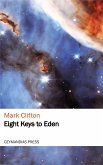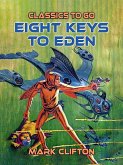Originally published in 1960, here is an enthralling science alien planet puzzle from Hugo Award winning writer Mark Clifton.When Eden, the Earth colony eleven light years away, goes silent and fails to answer any communications from the mother planet, Earth's government goes into a panic. Has something tragic happened on a world already proven to have no intelligent, dangerous lifeforms? Or, are the colonists purposely disregarding the messages for some reason of their own? What could be the real explanation for the mysterious silence of a disciplined, scientific colony?To learn the answer, Earth's leaders turn to the Extrapolators-the honored group of men and women with an almost superhuman ability to see to the core of any problem. Soon the Extrapolators assign a probationary Extrapolator, Calvin Gray, to the hazardous journey to Eden, where he will win full admission into the ranks to the Extrapolators if he solves whatever problems he finds there.But, even with his special Extrapolator training, Grey is not prepared for the extent ort nature of the disaster that has struck the colony Eden-thrown back to an almost subhuman state of existence without houses, tools, equipment, or clothing."e;Full of excitement. Richly rewarding. Genuinely mature philosophy tinged with gentle irony."e;-Galaxy magazine"e;Clifton was an innovator in the early 1950s and such an impressive innovator that his approach has become standard among science fiction writers. He used the common themes of science fiction-alien invasion, expanding technology, revolution against political theocracy, and space colonization-but unlike any writer before him, he imposed upon these standard themes the full range of sophisticated psychological insight."e;-Barry N. Malzberg, The Science Fiction
Dieser Download kann aus rechtlichen Gründen nur mit Rechnungsadresse in A, B, BG, CY, CZ, D, DK, EW, E, FIN, F, GR, HR, H, IRL, I, LT, L, LR, M, NL, PL, P, R, S, SLO, SK ausgeliefert werden.









